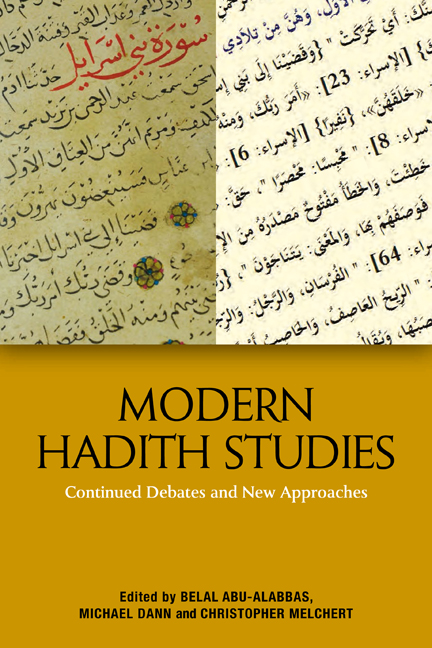Book contents
- Frontmatter
- Contents
- Figures and Tables
- Acknowledgements
- Note on Conventions
- Notes on Contributors
- Introduction
- 1 Kunnā nakrahu al-kitāb: Scripture, Transmission of Knowledge, and Politics in the Second Century AH (719–816 ce)
- 2 The History of the Adhān: a View from the Hadith Literature
- 3 Ibn al-Mubārak, Traditionist
- 4 Early ‘Traditionist Sufis’: A Network Analysis
- 5 The Common Link and its Relation to Hadith Terminology
- 6 Hadith Criticism between Traditionists and Jurisprudents
- 7 Hadith Criticism in the Levant in the Twentieth Century: From ẓāhir al-isnād to ʿilal al-ḥadīth
- 8 The Reception and Representation of Western Hadith Studies in Turkish Academe
- 9 Can Different Questions Yield the Same Answers? Islamic and Western Scholarship on Shiʿi Narrators in the Sunni Tradition
- Index
7 - Hadith Criticism in the Levant in the Twentieth Century: From ẓāhir al-isnād to ʿilal al-ḥadīth
Published online by Cambridge University Press: 01 October 2020
- Frontmatter
- Contents
- Figures and Tables
- Acknowledgements
- Note on Conventions
- Notes on Contributors
- Introduction
- 1 Kunnā nakrahu al-kitāb: Scripture, Transmission of Knowledge, and Politics in the Second Century AH (719–816 ce)
- 2 The History of the Adhān: a View from the Hadith Literature
- 3 Ibn al-Mubārak, Traditionist
- 4 Early ‘Traditionist Sufis’: A Network Analysis
- 5 The Common Link and its Relation to Hadith Terminology
- 6 Hadith Criticism between Traditionists and Jurisprudents
- 7 Hadith Criticism in the Levant in the Twentieth Century: From ẓāhir al-isnād to ʿilal al-ḥadīth
- 8 The Reception and Representation of Western Hadith Studies in Turkish Academe
- 9 Can Different Questions Yield the Same Answers? Islamic and Western Scholarship on Shiʿi Narrators in the Sunni Tradition
- Index
Summary
The hadith criticism movement in the Levant in the twentieth century was arguably one of the most active hadith movements in the Islamic world. Therein, ample work was produced and many prominent names emerged, such as Nāṣir al-Dīn al-Albānī (1914–99), ʿAbd al-Fattāḥ Abū Ghuddah (1917– 97), Shuʿayb al-Arnaʾūṭ (1928–2016), Nūr al-Dīn ʿItr (1934–) and Muḥammad ʿAwwāmah (1940–). The hadith movement in the Levant developed significantly during the twentieth century and had a significant influence on other countries. It was characterised by clear ideological developments and doctrinal conflicts. The hadith movement in the Levant was also multi-faceted. Some scholars focused their attention on the written and oral transmission of hadith works, while others were concerned with the textual content of the hadith corpus and its exegesis. Certain specialists dedicated their efforts towards responding to Western criticisms and others towards hadith terminology. Nevertheless, hadith criticism received the most attention. In this chapter I analyse the major trends of hadith criticism in the Levant, focusing on the methods of authenticating hadiths. Understanding these trends in the Levant is instrumental in comprehending the development of hadith criticism in the Islamic world, since the Levant, with its intellectual and doctrinal diversity, has been an important centre of Islamic scholarship in general and the sciences of hadith in particular.
In this chapter, I argue that the common classification of hadith-criticism trends based on the doctrinal ideology of the scholar is uncritical and inaccurate. The classification of hadith activity in the Levant should base its criteria solely on the methods of hadith criticism as this is the mechanism by which hadith criticism operates. Based on this, I demonstrate that there are two main trends. The first focuses on ẓāhir al-isnād (apparent dimension of the isnād) and adherence to the rules of the books of uṣūl al-ḥadīth. This approach is applied by al-Albānī, Abū Ghuddah and ʿItr, despite their different ideological commitments. This trend dominated the religious and academic atmosphere in the Levant for almost a century. Although they opposed al-Albānī doctrinally, Abū Ghuddah and ʿItr were generally consistent in applying his method of hadith criticism.
- Type
- Chapter
- Information
- Modern Hadith StudiesContinuing Debates and New Approaches, pp. 151 - 170Publisher: Edinburgh University PressPrint publication year: 2020



